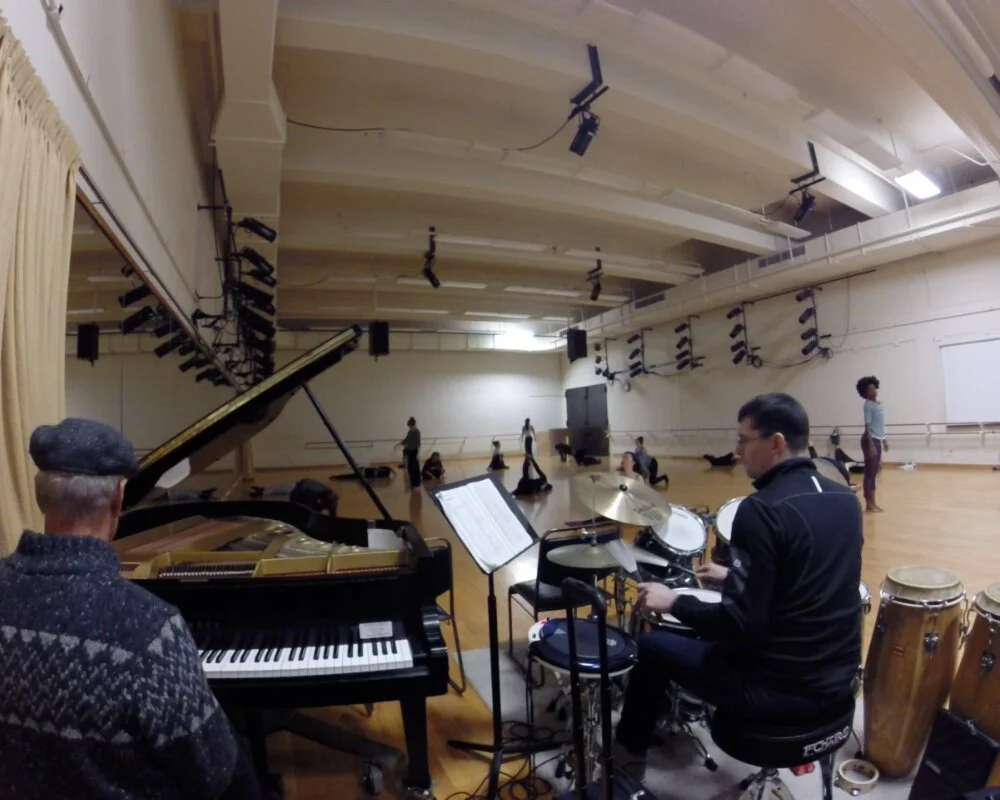Each type of music has unique aspects, but making music with dance has a few things that make it stand alone. To me, the biggest difference is that music for dance serves a practical purpose outside of itself. When it happens, it happens because it is needed. Once 5-6-7-8 is counted, the people in the room need the grounding pulse to to sync with one another. But they also need the rhythm that propels, the color of texture and harmony, the line of melody, and the structure of form, to learn and deeply encode choreography in their body, and understand the space they’re creating with movement. It’s a bit like creating the wave that the dancers “surf” on. You can surf without a wave, but it takes a lot of paddling! When dancers begin moving to music you’re playing, they take that energy and send it back in an exhilharating cycle of sound and motion.
The dance studio is both a performance space and a laboratory. Dance classes and rehearsals are daily rituals where dancers grow personal knowledge within their bodies, and a collective experience is created. All participants (including musicians) simultaneously perform for one another and experiment with new ways of doing things. This hybrid space allows dance musicians to build the the skills, knowledge, experience, and relationships on the path to becoming more complete, supportive, and generous collaborators.
Success or failure is evaluated by a different set of criteria than in other types of performance. To be successful as a dance musician, one must let go of perfect execution as the ideal, and begin to understand “failure” not as an end but as an opportunity to make decisions and continue without hesitation. Dance class is the time and place for experimentation, risk-taking, and accepting success or failure with equal boldness.
Be unafraid to fail. Dancers are taking risks and failing daily. You must do the same in order to give them what they need. You can no longer be afraid of failure or trying to avoid it. In order to be a successful dance musician, you have to be able to throw out all the ways of evaluating success or failure you’ve learned your whole life in other musical situations. I have found that sometimes the music that seemed "wrong" to me (using my old ways of evaluating) was enthusiastically appreciated by the dancers, because it was "right" for the energy in that space, at that moment.
A dance musician must treat their playing with gravity, however simple or uninteresting it may seem to them. This means a shift of focus from executing the skill of playing music to making music for a moment.
A dance musician develops the ability to make musical decisions very quickly, stick with them and see them through. All of your prior musical training and experience will be employed, with only 4 counts notice. You basically get 5-6-7-8 and your are making music NOW. Often, there is little or no time to ask questions and the score is the movement you’re seeing.
A dance musician must be musically courageous! If you don’t already have musical COURAGE, you’ll develop it playing for dance class. Have you ever HAD to play an “adagio” on djembe? Have you ever HAD to improvise as a soloist faster than you can play on an instrument? Have you ever HAD to make music on an instrument you don’t know how to play all that well? As a dance musician, you'll likely end up having to face challenges like these, and you’ll do so without fear.
A dance musician must work as hard to dance the music as the dancers have to to dance the dance.
Creative and courageous!

